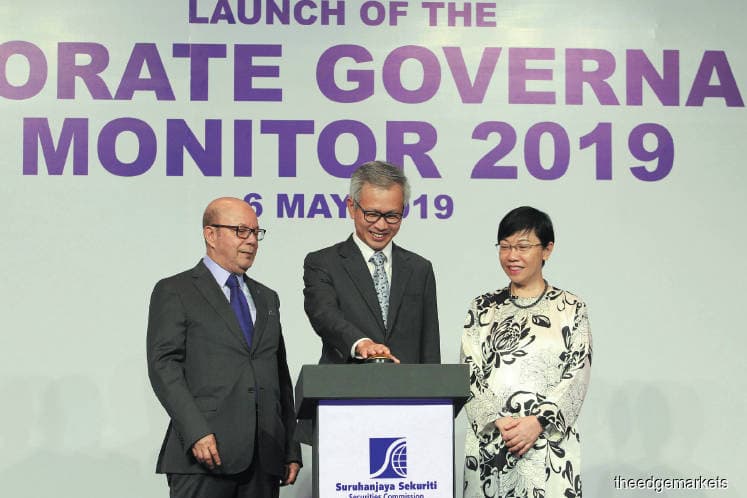
This article first appeared in The Edge Financial Daily on May 7, 2019
KUALA LUMPUR: The Securities Commission Malaysia (SC) said it will be reviewing anti-corruption measures taken by Bursa Malaysia-listed companies this year, as part of its effort to implement the National Anti-Corruption Plan (NACP) launched by the government in January.
SC chairman Datuk Syed Zaid Albar, speaking at the launch of its inaugural Corporate Governance (CG) Monitor here yesterday, said this would be an area of focus, in support of the NACP 2019-2023 which identified corporate governance to be one of the six priority areas under the plan.
“Pursuant to Budget 2019 announcement, the SC will be looking at key pay ratios of listed companies, [and] findings from both reviews will be included in the 2020 edition of the CG Monitor,” he said.
Finance Minister Lim Guan Eng, in his speech read by his political secretary Tony Pua, implored listed companies to implement the Malaysian Code on Corporate Governance (MCCG), which recommends that boards establish a Code of Conduct and Ethics containing policies and procedures on anti-corruption.
This is in line with the restoration of the country’s health and credibility as corruption inhibits economic growth and affects business operation, Guan Eng said.
“The new government’s top agenda is to restore credibility and trust in the government and public institutions by upholding integrity and fighting corruption.
“We must ensure that there will be no opportunity for another 1Malaysia Development Bhd (1MDB) to rear its ugly head in this country, whether by the current leadership or any future leadership who become corrupt with power,” he said.
Guan Eng pointed out that besides the NACP, which was launched to build a corrupt-free nation that upholds transparency and accountability, Parliament has even introduced a corporate liability provision in the Malaysian Anti-Corruption Commission Act, where a commercial organisation and its directors may be found liable for acts of corruption committed by any persons associated with the organisation, including its employees.
The SC’s CG Monitor 2019 yesterday presented findings on three themes — long-serving independent directors, gender diversity on boards and chief executive officer (CEO) remuneration of the top 100 listed companies.
It observed a reduction in the average tenure of independent directors to five years as at end-2018, from seven years in 2015, which may be attributed to greater scrutiny by shareholders and the need to seek shareholders’ annual approval to retain long-serving independent directors beyond nine years.
Progress in terms of gender diversity on boards was also made, as the target set in 2017 to have no all-male boards in the top 100 listed companies by end-2018 was achieved.
It pointed out that there was a seven percentage point increase in board positions held by women for the top 100 listed companies (from 16.6% to 23.68%) and a four percentage point increase (from 12% to 15.69%) for all listed companies.
On CEO remuneration, the SC said 81% of CEOs in the top 100 listed companies by market capitalisation were paid RM10 million or less.
Overall, it said over 70% of the 841 Main Market and ACE Market-listed companies adopted the MCCG best practices, with 74% of the companies adopting at least one Step Up practice, and listed companies generally provided disclosures which contained the minimum information required to explain the adoption or departure from the MCCG practices.
“I would like to record my appreciation to board members who have taken the effort to ensure that their companies’ CG disclosures are clear, comprehensive, and meet the disclosure standards set by the SC and Bursa.
“In fact, mid and small cap companies are among the trailblazers in the adoption of the CG best practices... This shows that we are moving towards the right direction with greater appreciation of the value of adopting good CG practices, even among the smaller companies,” said Syed Zaid.